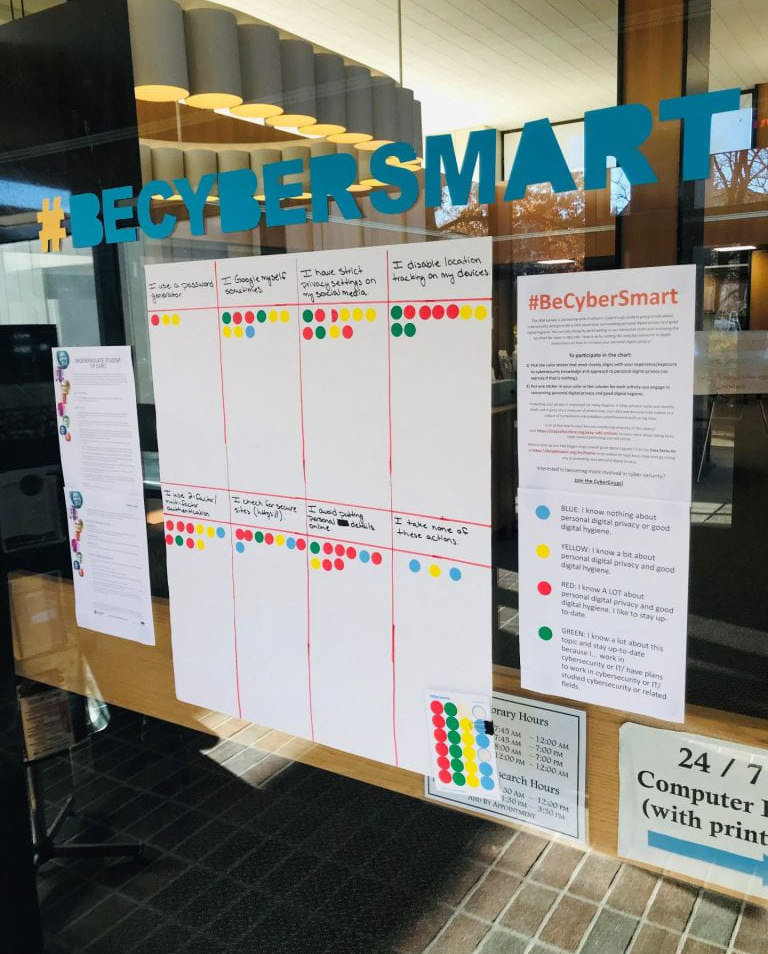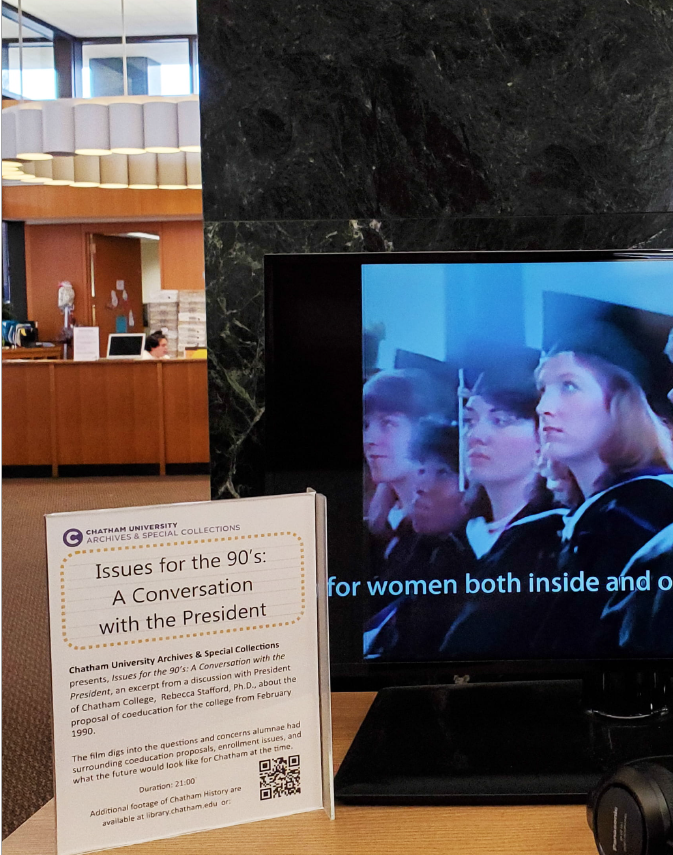As we live more and more of our lives on the Internet, it’s important to take personal digital privacy seriously. Hacking techniques can be very sophisticated, and a breech in your privacy can have devastating effects. Learning how to protect your data and your privacy online, as well as how to develop good digital hygiene, is becoming more and more important.
Last semester (fall 2019), we conducted an informal #BeCyberSmart survey of our patrons, asking which level of familiarity they have with personal digital privacy and which actions they take to protect their personal information online.
Patrons were asked to select a sticker color that corresponded with their knowledge level and place those stickers in the columns representing actions they have taken to protect their personal digital privacy. Below are the results of this interactive informal survey.
While most participants have indicated that they know at least a little bit about personal digital privacy and cybersecurity, there is always room for more knowledge! The more you know, the better able you are to protect yourself online. Below we’ve compiled a quick list of resources for you to use when going about a personal digital detox or increasing your personal digital privacy.
1) Use a password manager like Bitwarden or LastPass.
2) Go through the Data Detox Kit: https://datadetoxkit.org/en/home
From the website… “The Data Detox Kit’s clear suggestions and concrete steps help people harness all aspects of their online lives, making more informed choices and changing their digital habits in ways that suit them.”
Follow simple step-by-step guides to cleaning up your digital presence and locking down your digital privacy
Includes tips and tricks for how to maintain your privacy and good digital hygiene
Offers alternatives to popular apps that do not respect your privacy or pose threats to your privacy
Developed by Berlin-based organization called Tactical Tech in partnership with Mozilla
3) Swap out Google for DuckDuckGo: https://duckduckgo.com/
DuckDuckGo is a privacy-focused search engine that runs off of the same search index as Bing, which means it isn’t quite as intuitive as Google, but your
information stays safe!
It does NOT track your searches
It has a very useful browser plug-in that will “grade” each website you visit in terms of how well that website will protect your personal digital information:
https://addons.mozilla.org/en-US/firefox/addon/duckduckgo-for-firefox/
It blocks ads for you. We still recommend adding additional ad blockers (The Data Detox Kit has great suggestions)
When coupling DuckDuckGo with Firefox, you’re off to a good start in terms of protecting your privacy while using the Internet
4) Feeling really adventurous? Try out Brave Browser: https://brave.com/
From the website… “You deserve a better Internet. So we reimagined what a browser should be. It begins with giving you back power. Get unmatched speed,
security and privacy by blocking trackers. Earn rewards by opting into our privacy-respecting ads and help give publishers back their fair share of Internet revenue.”
Brave goes beyond protecting your privacy. It revolutionizes how companies monetize their online presence and put that power in your hands. Instead of suffering through ads, you get to decide where your money goes. And if you decide you’re ok with ads, you get rewarded for it!
Brave does not collect your data and gives you incredible control over your own Internet experience
5) Visit the Electronic Frontier Foundation and read up on current affairs concerning personal digital privacy online and more: https://www.eff.org/issues/net-neutrality From the website… “The Electronic Frontier Foundation is the leading nonprofit organization defending civil liberties in the digital world. Founded in 1990, EFF champions user privacy, free expression, and innovation through impact litigation, policy analysis, grassroots activism, and technology development. We work to ensure that rights and freedoms are enhanced and protected as our use of technology grows.”
They advocate for safe, secure, and equitable access to Internet resources for all Take advantage of their numerous tools and additional resources to protect Internet users’ privacy: https://www.eff.org/pages/tools
Volunteer with the EFF and contribute even more!
Commenting on blog posts requires an account.
Login is required to interact with this comment. Please and try again.
If you do not have an account, Register Now.
Archival footage on display in the JKM Library As part of an ongoing, rotating showcase of recently digitized media in the lobby of the JKM Library, the Chatham University Archives & Special Collections is pleased to present “Issues for the 90s: A Conversation with the President.” This film features Dr. Rebecca Stafford, President of Chatham from 1983 until 1990, discussing a proposal for coeducation brought forth to the college community in 1990. The footage was reformatted through support from the Council of Independent Colleges.
Members of the Chatham community and the public are welcome to enjoy the presentation.
The film digs into the questions and concerns alumnae had in the 1990s about the coeducation proposal, enrollment issues, and the future of Chatham College (now University). According to the footage, coeducation was being considered because of concern about enrollment projections and a desire to sustain the institution. Dr. Stafford mentions that growth in adult education at women’s colleges, like the Gateway Program at Chatham, served to increase enrollment numbers overall but did not provide a sustainable model over the long term. Rather, she concluded, Chatham needed to develop a plan to attract more residential students. Moreover, it is illuminating to learn that coeducation had been considered several times over the course of Chatham’s history. The footage of Dr. Stafford was recorded in February of 1990, a full twenty-five years before Chatham’s undergraduate programs became coed. The Coeducation Debate Collection (click here for the finding aid) includes records of the first formal consideration of coeducation at Chatham in the late 1960s and petitions from faculty, students, and alumnae when the issue was raised in 1990. In the footage on view, Dr. Stafford mentions that Board of Trustees discussed coeducation when changing the school’s name from The Pennsylvania College for Women to Chatham in the 1950s. She notes the trustees were concerned that Chatham must “have a name that doesn’t have `women’ in it."
Board of Trustee Minutes from 1954 discussing coeducation.
The “Issues for the 90s: A Conversation with the President” is on view in the JKM Library lobby for the enjoyment of members of the public and the Chatham
community. Those interested in exploring the history of coeducation at Chatham are encouraged to explore the film and related material in the Chatham University Archives and Special Collections.
By Janelle Moore, Archives Assistant, and Molly Tighe, Archivist & Public Services Librarian




From the dated to the down-right goofy, we all know that library books can have some of the most outlandish covers ever seen. We know, we know…we’re not supposed to judge a book by its cover. And that’s true! Many amazing books have been saddled with less than appealing covers, and we should give them a fighting chance before writing them off, but for right now, for just this purpose, in this moment, we are going to judge the heck out of some book covers! Join us in March and April for our first ever Judge a Book by Its Cover bracket. We have selected 16 of our most ridiculous covers for you to compare and vote for the best/worst. Each book featured in the bracket is from our collection and is available for check-out by Chatham community members. You’ll be able to browse them at the Popular Reading display on the first floor of the JKM Library. We encourage you to pick them up and read their synopses! Because, after all, we can’t judge what’s inside by what’s outside, can we? We welcome you to check them out at any time. Round One will begin on Friday March 6th and last until Tuesday March 17th . Each following round will last about a week, wrapping up on Monday April 6th ! Voting during each round will happen in a number of ways. First, we will have the bracket laid out on our Art Wall on the first floor of the JKM Library. Don’t know where that is? Ask at the Circulation or Reference desks! Each book cover will be posted, and you will be able to vote for you favorite in each matchup by adding a sticker next to the cover you love to hate the most. We will also be posting each matchup to social media and will encourage folks to vote for their favorites in the comments. Votes will be tallied at the end of each round and added to the votes from the Art Wall. Winners will then move on to the next round, and so on and so forth until we have selected our most gloriously bad book cover! If you want to play along, you can download a bracket here or pick one up in the library. The book covers are included with the bracket, and they are added below along with the Round One matchup. If you want to share your filled-out brackets with us, post to social media with #BookCoverBracket. We would love to share your perfect bracket! We hope you enjoy our inaugural Judge a Book by Its Cover bracket and that it inspires you to check out a book you might have discounted before.
Commenting on blog posts requires an account.
Login is required to interact with this comment. Please and try again.
If you do not have an account, Register Now.